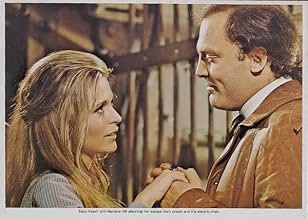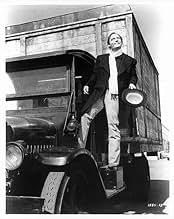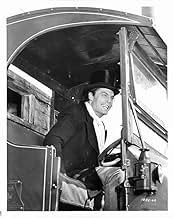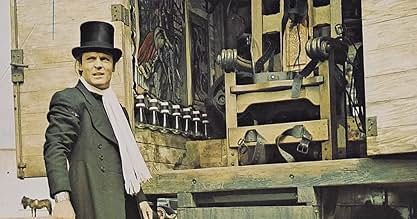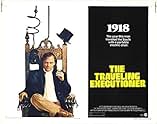Agrega una trama en tu idiomaStacy Keach is electrifying as Jonas Candide, an ex-carny who in 1918 travels around the bayou with a portable electric chair. At $100 a head, he renders his services with loving care. But t... Leer todoStacy Keach is electrifying as Jonas Candide, an ex-carny who in 1918 travels around the bayou with a portable electric chair. At $100 a head, he renders his services with loving care. But then he falls for a female "client".Stacy Keach is electrifying as Jonas Candide, an ex-carny who in 1918 travels around the bayou with a portable electric chair. At $100 a head, he renders his services with loving care. But then he falls for a female "client".
- Dirección
- Guionista
- Elenco
Marianna Hill
- Gundred Herzallerliebst
- (as Mariana Hill)
James Sloyan
- Piquant
- (as James J. Sloyan)
- Dirección
- Guionista
- Todo el elenco y el equipo
- Producción, taquilla y más en IMDbPro
Opiniones destacadas
This movie made a huge impact when I saw it in the theater. I was a tough (or so I thought) eighteen year old young man here in Vancouver when I saw it in 1970. I think that it might have played for a week.
I loved the humanity and charm that Stacy Keach brought to the executioner's role. I remember the loving way that he would sooth the fears of the condemned as they faced the terrors to come. It was a job that had to be done, and if he was the one to do it, he demanded craftsmanship and style.
The ending caught a deep nerve and I cried as I left and walked home. (It remains the only film that I can say that about). It is amazing how a film that is almost unknown has remained so brilliant in my mind.
I suspect that I might give it a higher rating if I ever saw it again.
I loved the humanity and charm that Stacy Keach brought to the executioner's role. I remember the loving way that he would sooth the fears of the condemned as they faced the terrors to come. It was a job that had to be done, and if he was the one to do it, he demanded craftsmanship and style.
The ending caught a deep nerve and I cried as I left and walked home. (It remains the only film that I can say that about). It is amazing how a film that is almost unknown has remained so brilliant in my mind.
I suspect that I might give it a higher rating if I ever saw it again.
This here thing purely is an oddity.
This is most definitely a Stacy Keach movie and most definitely a 'southern period wacky black comedy' product of 1970.
Despite the absurdity of the plot, the writers keep it on point.
Might be a good companion piece to "The Ninth Configuration" 1980.
If for no other reason than a young M. Emmet Walsh at work.
A short word on this marvelous rare to find movie; Well what can I say, except we find here a Stacy Keatch in what my humble opinion may be, one of his greatest roles ever put by him onto screen. He's an executioner who gets paid 100 bucks for each execution. The year we're in is 1918 South states of America. `The traveling executioner' is a black comedy love-story with a western undertone. It's the music that creates that pleasure full funny western feeling. What for sure is marvelous in this movie. The moment he's starting philosophizing to the condemned to death by his electric chair are `quality moments' in this movie. Not even to mention the funny truck he drives thru the country to visit every possible jail to for fill his task. The conversations are sometimes hilarious. Example, the moment he rents out hookers to some inmates. They each have to pay him, and on the amount they pay, he decides how much time they get.
Executioner, `Well for this you get room 5 and 4 minutes'. Inmate, `What kinda cover can I shoot in 4 min?' Executioner, `Well you gat from now 4 minutes, so start shooting'.
So the humor is one of a kind, and the love tale is great. `The contract killer badly in love with his victim'. The story goes on to a strange, though org. road. I try not to spoil too much, but will the executioner exchange his chair for her life, or will he even meet his own electric chair for real by trying to save her. Well it is a fact he doesn't leave any way unexplored to rescue her from her death sentence. Are you in for a funny black romantic comedy movie. With a superb, strong acting Stacey Keatch go for this one, for sure a must see!
Dario/
Executioner, `Well for this you get room 5 and 4 minutes'. Inmate, `What kinda cover can I shoot in 4 min?' Executioner, `Well you gat from now 4 minutes, so start shooting'.
So the humor is one of a kind, and the love tale is great. `The contract killer badly in love with his victim'. The story goes on to a strange, though org. road. I try not to spoil too much, but will the executioner exchange his chair for her life, or will he even meet his own electric chair for real by trying to save her. Well it is a fact he doesn't leave any way unexplored to rescue her from her death sentence. Are you in for a funny black romantic comedy movie. With a superb, strong acting Stacey Keatch go for this one, for sure a must see!
Dario/
This is an exceptionally difficult movie to see. As others have noted, it has not received a DVD release, and the VHS video is difficult to track down and probably prohibitively expensive if found.
I saw it just the once, on TV, about ten years ago, but it made a strong impression on me. Stacy Keach gives a very brilliant performance as that most paradoxical of beings: a likable, humane executioner. He is ably supported by Bud Cort who adds his undertaker character to the gallery of eccentric young men that were his early stock in trade.
I also recall the general atmosphere of levity, a failure to take the central theme of the movie - death - very seriously. This is possibly explained by the fact that in 1970 (or, more probably 1969, when the film is likely to have gone into production) the death penalty itself probably seemed to have become a permanent relic of the past, unlikely to be employed again as the United States joined most of the developed world in rejecting it de facto if not yet de jure. (This abolition was only confirmed in 1972, and was short lived, as it happened.) The movie - although much blacker in its comedy - has a similar feel to "Butch Cassidy and the Sundance Kid" (or its TV doppelgaenger, "Alias Smith and Jones"). In these, the Wild West had been somehow not merely domesticated, but suburbanised, and there was an overlay of late 60s/early 70s Southern Californian sensibilities on the period setting. "The Traveling Executioner" does something similar to the Deep South of the late 1910s.
The return of capital punishment in the U.S. in the late 1970s (and its mounting use in the 80s and 90s) is likely to distort the perceptions of those too young to remember the atmosphere of the time in which the movie was made, when its black humour appeared to be excused by the fact that the actual horrors of execution that it so lightheartedly depicted seemed unlikely to reappear.
I saw it just the once, on TV, about ten years ago, but it made a strong impression on me. Stacy Keach gives a very brilliant performance as that most paradoxical of beings: a likable, humane executioner. He is ably supported by Bud Cort who adds his undertaker character to the gallery of eccentric young men that were his early stock in trade.
I also recall the general atmosphere of levity, a failure to take the central theme of the movie - death - very seriously. This is possibly explained by the fact that in 1970 (or, more probably 1969, when the film is likely to have gone into production) the death penalty itself probably seemed to have become a permanent relic of the past, unlikely to be employed again as the United States joined most of the developed world in rejecting it de facto if not yet de jure. (This abolition was only confirmed in 1972, and was short lived, as it happened.) The movie - although much blacker in its comedy - has a similar feel to "Butch Cassidy and the Sundance Kid" (or its TV doppelgaenger, "Alias Smith and Jones"). In these, the Wild West had been somehow not merely domesticated, but suburbanised, and there was an overlay of late 60s/early 70s Southern Californian sensibilities on the period setting. "The Traveling Executioner" does something similar to the Deep South of the late 1910s.
The return of capital punishment in the U.S. in the late 1970s (and its mounting use in the 80s and 90s) is likely to distort the perceptions of those too young to remember the atmosphere of the time in which the movie was made, when its black humour appeared to be excused by the fact that the actual horrors of execution that it so lightheartedly depicted seemed unlikely to reappear.
One of the great forgotten cinematic gems of yesteryear! From 1970, a young, whipcord fit, badass Stacy Keach stars as Jonas Candide, a traveling executioner who cruises the American South with his beloved portable electric chair, pulling the switch on murderers and thieves in 1918. Keach is shockingly good as he gets caught up in a scheme to save the life of a beautiful German woman slated for execution.
Keach's trademark facial scar is on full display here, not obscured by a mustache as it would be almost forevermore in later films. It adds something to the role, like a tiny crack in an otherwise perfect human statue. The film also features character actor Bud Cort in an early role.
The opening and finale scenes where Keach delivers Jonas' Fields of Ambrosia monologues are some of the best in 1970s cinema, and Jonas Candide is one of the great characters of Seventies film, he's a drunkard, a womanizer, a liar, a glutton, (the massive meal Candide sits down to eat after an execution has to be seen to be believed, massive plates of biscuits, Canadian bacon and Darwin knows what else) yet beneath it all he has a heart, Jonas, like the film, is darkly funny and darkly lovable.
Fantastically directed by Jack Smight, with a fine score by Jerry Goldsmith, and the seemingly only feature film screenplay credit by forgotten rebel screenwriter Garrie Bateson.
If there ever was a Traveling Time Traveler, a jump back into the wayback machine could correct the travesty of not nominating this film for Oscars for Best Actor, Best Director, Best Original Screenplay and Best Picture in 1970!
Keach's trademark facial scar is on full display here, not obscured by a mustache as it would be almost forevermore in later films. It adds something to the role, like a tiny crack in an otherwise perfect human statue. The film also features character actor Bud Cort in an early role.
The opening and finale scenes where Keach delivers Jonas' Fields of Ambrosia monologues are some of the best in 1970s cinema, and Jonas Candide is one of the great characters of Seventies film, he's a drunkard, a womanizer, a liar, a glutton, (the massive meal Candide sits down to eat after an execution has to be seen to be believed, massive plates of biscuits, Canadian bacon and Darwin knows what else) yet beneath it all he has a heart, Jonas, like the film, is darkly funny and darkly lovable.
Fantastically directed by Jack Smight, with a fine score by Jerry Goldsmith, and the seemingly only feature film screenplay credit by forgotten rebel screenwriter Garrie Bateson.
If there ever was a Traveling Time Traveler, a jump back into the wayback machine could correct the travesty of not nominating this film for Oscars for Best Actor, Best Director, Best Original Screenplay and Best Picture in 1970!
¿Sabías que…?
- TriviaThis was filmed at Alabama's then recently closed Kilby Prison off of Coliseum Blvd. in Montgomery. As part of an agreement with the state for filming rights, filmmakers were supposed to have demolished the prison's massive walls with pyrotechnics during/after the film. However, the walls were so thick, three charges failed to do the job, and their remnants stayed around for years afterwards.
- ErroresAn important plot point is the existence of a portable electric chair which makes the career of "traveling executioner" possible. Unfortunately, as shown in the movie, it can't work. To perform an execution Keach "starts" a big electric generator in his horse-drawn van. But the generator has no power source! At the time the story takes place the internal combustion engine was new and rudimentary. The only transportable source of mechanical power was the steam engine. There were no diesel powered generators. Of course a steam engine large enough to produce the necessary mechanical power to turn the electric generator would have been almost as large as the van and would have required hours to build up enough steam to do the job. Also, a substantial amount of coal to make the steam would be needed. In any case, no motive power is shown and this explains why there were likely no traveling electrocutionists. Why a remote prison would not simply hang convicted criminals is likewise not explained.
- Citas
Jonas Candide: [seduced by Gundred] Her ass is too good to fry!
- ConexionesEdited into The Lost Empire (1984)
Selecciones populares
Inicia sesión para calificar y agrega a la lista de videos para obtener recomendaciones personalizadas
- How long is The Traveling Executioner?Con tecnología de Alexa
Detalles
- Tiempo de ejecución1 hora 35 minutos
- Mezcla de sonido
- Relación de aspecto
- 2.35 : 1
Contribuir a esta página
Sugiere una edición o agrega el contenido que falta

Principales brechas de datos
By what name was The Traveling Executioner (1970) officially released in Canada in English?
Responda

